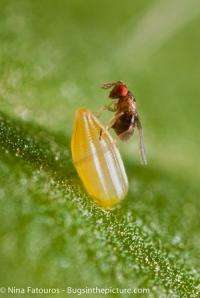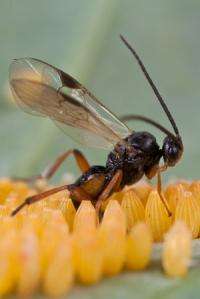Plants cry for help when an attack can be expected

Eggs of insect pests deposited on plants trigger the production of scents by plants that affect different plant community members probably helping the plant to get rid of the pest before it becomes harmful.
These results are reported the journal PLOS ONE by researchers, of the Laboratory of Entomology of Wageningen University and the Netherlands Institute of Ecology (NIOO-KNAW).
The research team, led by Nina Fatouros, tested how parasitic wasps, natural enemies of a common cabbage pest, the large cabbage white butterfly, and gravid butterfly females respond to black mustard, a cabbage relative, emitting scents during the initial phase of herbivore attack, when eggs are laid.

They show that butterfly egg deposition triggers highly specific chemical and structural changes in the plant that attract different parasitic wasps attacking either butterfly eggs or caterpillars but repel egg-laying butterflies. However, egg deposition by a less common pest, the cabbage moth, does not trigger such changes.
A specific plant response to butterfly egg deposition might help the plant defending itself before actual damage by hatching caterpillars starts.
More information: Plant Volatiles Induced by Herbivore Egg Deposition Affect Insects of Different Trophic Levels, Plos ONE, August 2012, Volume 7, Issue 8, e43607
Journal information: PLoS ONE
Provided by Wageningen University

















